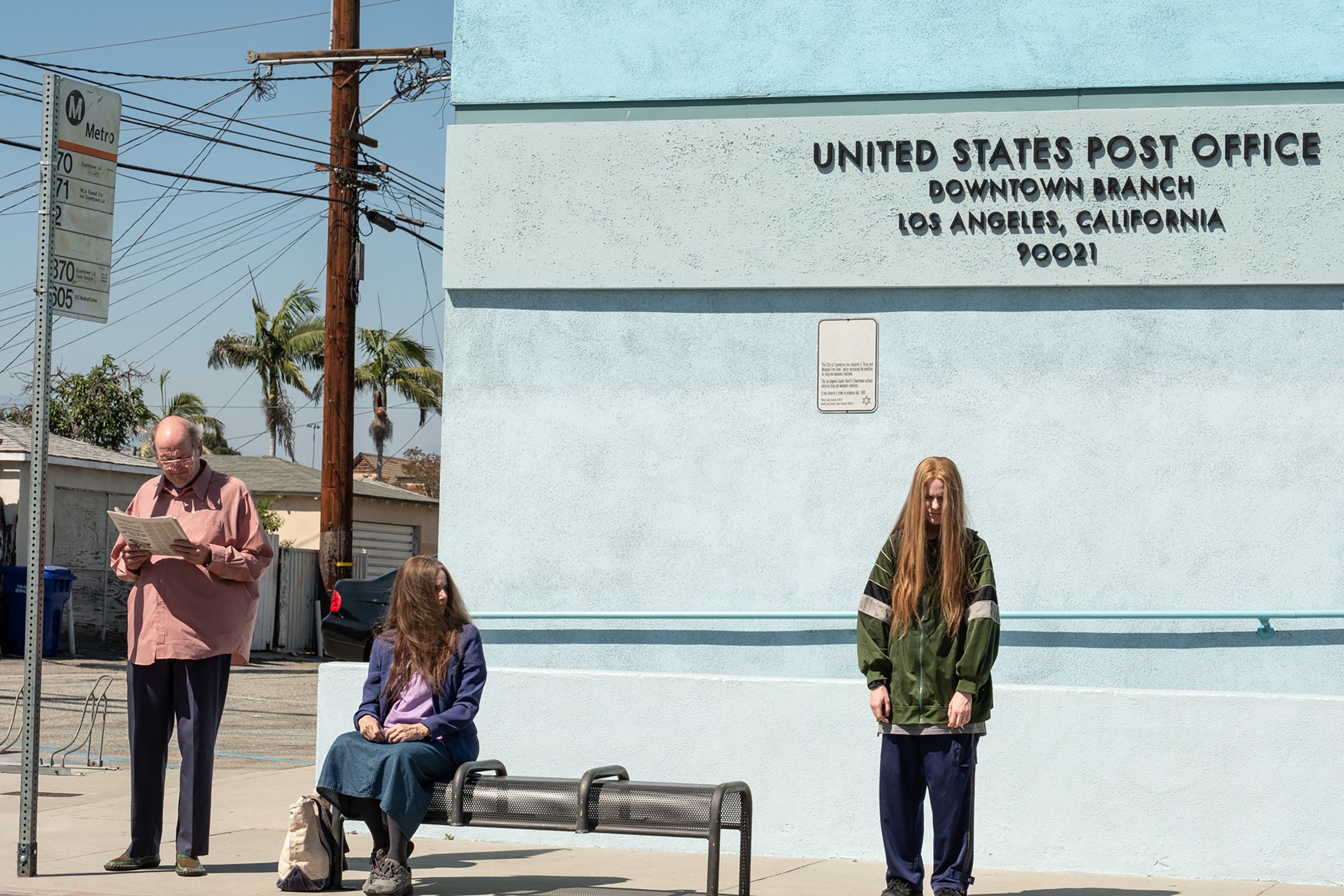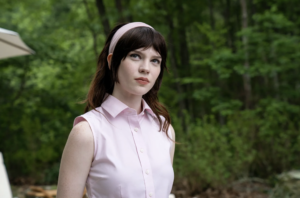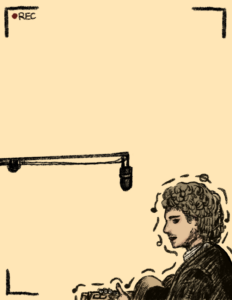Kajllionaire (2020) is first and foremost a weird movie. Most elements of the film—from the quirky characters paranoid of every rumble or quake to the puzzling visuals of pink foam flooding through cracks in a wall—seem bizarre on their own. However, amidst all the strange and loud elements is a soft story of self-discovery and first love. Kajillionaire is engagingly eccentric with complex characters and an emotional story of personal growth and escaping toxic family.
Kajillionaire follows a young woman named Old Dolio Dyne (Evan Rachel Wood) who has been raised in isolation by her eccentric, yet not particularly successful, con artist parents. Old Dolio’s parents live by a strange set of rules, refusing the trappings of mainstream society while also existing in constant fear of earthquakes and turbulence. Together the family commits small cons for a living, splitting their meager profits three ways, creating the illusion of independence within the family unit. In reality, Old Dolio has never actually spent her share of the money on anything for herself.
During a lost luggage scam, in which they pretend to lose their bags after a flight in order to redeem the insurance check, the group meets the young Melanie Whitacre (Gina Rodriguez) who they invite to participate in their scams as part of a longer con. Old Dolio grows jealous as she sees her parents extend warm affection to Melanie, something she was deprived of as a child. After witnessing the emotional abuse Old Dolio suffers at her parent’s hands, Melanie gives her an escape, helping her explore her agency away from her parent’s overbearing influence. The two slowly fall in love over the course of their adventures together.
The strongest element of Kajillionaire is its peculiar characters—Old Dolio’s parents, Theresa (Debra Winger) and Robert Dyne (Richard Jenkins), in particular. Their paranoia and unconventional behavior make them appear harmless, however, the audience slowly sees how cunningly manipulative they can be. Melanie serves as a point of contrast, a “normal” character amidst eccentricity. Her fierce independence and positivity seem to be the polar opposite of Old Dolio’s more meek personality. Melanie’s presence and her reaction to certain events help reveal the intricate web of guilt, obligation, and degradation the Dynes have trapped their daughter in.
Wood’s character, Old Dolio—who her parents named after a homeless man that won the lottery in the hopes that she would be added to the man’s will—is easily the strongest character in the film. Old Dolio has been shaped by her parents’ strict control, in turn perpetually fearful of the normal world and naturally reclusive. Her childhood was so devoid of human touch that, as an adult, she cannot stand to have a masseuse touch her at the beginning of the film. However, it is also clear that Old Dolio is extremely smart. She is the one who executes most of the scams and even formulates the solution to her family’s rent problem. And yet her parents’ emotional abuse is so pervasive that she lacks independence. Subtle nuances to her personality shine through side scenes of birthing classes or existential crises in gas station bathrooms.
One of the most interesting narrative threads of the movie is the relationship between Old Dolio and her parents. It becomes increasingly clear to the audience that this family is incredibly toxic, filled with varying levels of emotional abuse. Following a confrontation between the four main characters, Old Dolio is given the chance to escape as she flees her parents with Melanie. Her parents let Old Dolio go deceptively easily, not even calling once to persuade her to come back. A few days later, however, they show up at Melanie’s apartment with 18 presents, seemingly trying to make up for their past neglect. They celebrate Old Dolio’s birthdays, nowhere near the actual date of her birth, at an expensive restaurant, making an emotional speech about how proud of her they are and how important she is to them. It is hard to fully believe their words, but the performance, a scam in its own way, is extremely convincing, pulling the viewer along even as they hope Old Dolio doesn’t go back.
And she doesn’t. Kajillionaire concludes with one last manipulative betrayal. They tuck Old Dolio in at Melanie’s apartment promising to see her the following day. Melanie remains unconvinced so her and Old Dolio agree that if the money from the lost luggage scam is gone, the parents can’t be trusted, if it’s still there, they may have changed, if only a third of it is left (Old Dolio’s usual share), they can never change. Surprisingly, the money is all still there and the women go to bed, Old Dolio hoping to fix her relationship with her parents and Melanie extremely confused. However, the reveal comes the following morning when the women wake up to discover that, while they were sleeping, the Dynes stole everything in Melanie’s apartment including the money, leaving only the toys they bought as birthday presents. When the girls return the gifts, the total adds up to exactly Old Dolio’s third of the scam. Not only does this prove that her parents are incapable of changing, but it shows how shamelessly they manipulate their daughter’s emotions to get what they want. This reveal is extremely well done as it subverts the viewer’s expectations only to deliver the emotional punch once the anticipation has passed.
The quirkiness of the film was not limited just to the characters but extended into the bizarre yet engaging visuals. The recurring image of pink soap suds falling down the wall of the family’s abandoned office apartment never once loses its oddity even after it is explained that they come from a leak in the neighboring soap factory: a mundane explanation for a fantastical visual. Perhaps there is a metaphor in there somewhere, but it serves its purpose in the film just by being odd. Melanie and Old Dolio’s relationship is beautifully captured in a scene where Old Dolio attempts to reattach Melanie’s acrylic nail after accidentally tearing it off. The admittedly strange interaction is captured with closeups and shallow depth while soft rays of light shine through the diner windows. The most striking scene in Kajillionaire occurs in a gas station bathroom during an earthquake. Believing herself to have died, Old Dolio feels an incredible release and, as she describes this feeling to Melanie, the darkness of the gas station bathroom slowly shifts to a view of the night sky.
But there were moments throughout the film where it felt like artistry was prioritized over plot and character development, resulting in a few unsatisfying moments and underexplored character traits. Melanie’s character is the least explored. Beyond serving as the independent, normal juxtaposition to Old Dolio, she does not get much character inspection. There is a hint at the beginning of the film of a tumultuous relationship with her mother, but as that storyline is not given sufficient screentime, we receive very little insight into Melanie’s motivations or desires. Certain elements of Theresa and Robert Dyne’s characters that were left unexplained also had the potential to be very interesting. There is never any explanation for their fear of earthquakes and, though there is a certain appeal to that habit being cryptic in the beginning, the complete lack of backstory was ultimately frustrating.
Though it felt like the film’s artistic attempts to be vague and mysterious sometimes opened up plot holes and compelled out of character behavior, these flaws are minor when compared to the overall success of the character development. Kajillionaire is a strange movie with quirky characters to match, but within this eccentricity is an important story about healing from neglect and abuse and making one’s own place in the world. This is a movie that should be enjoyed for the craziness and the characters, not for some complex heist plot. Old Dolio’s character arc was incredibly powerful and she never once lost her peculiarities, instead finding her own place in the world with Melanie by her side. Just like its subjects, Kajillionaire is wonderfully weird in every way.





